Functional mushrooms, also known as medicinal mushrooms, have a long history of treating challenging and serious disorders. These incredible plant powerhouses contain phytonutrients that support the process of repair. Functional mushrooms can provide pain relief resulting from fibromyalgia and autoimmune disorders, and help heal from cancer, depression, and inflammatory diseases.
So many people struggle to heal their chronic or serious ailments, regardless of how many medications they try. With everyone searching for relief, it’s a wonder that the natural world provides many astonishing remedies.
Of the thousands of mushroom varieties known around the world, a few hundred of them have medicinal value! Although many have been used for millennia in Asia, particularly in Traditional Chinese Medicine (TCM), this knowledge has only gradually made its way westward.
We now see an upsurge of information around the world, and functional mushroom products are much more widely available than ever before. They’re almost becoming a trend or a fad.
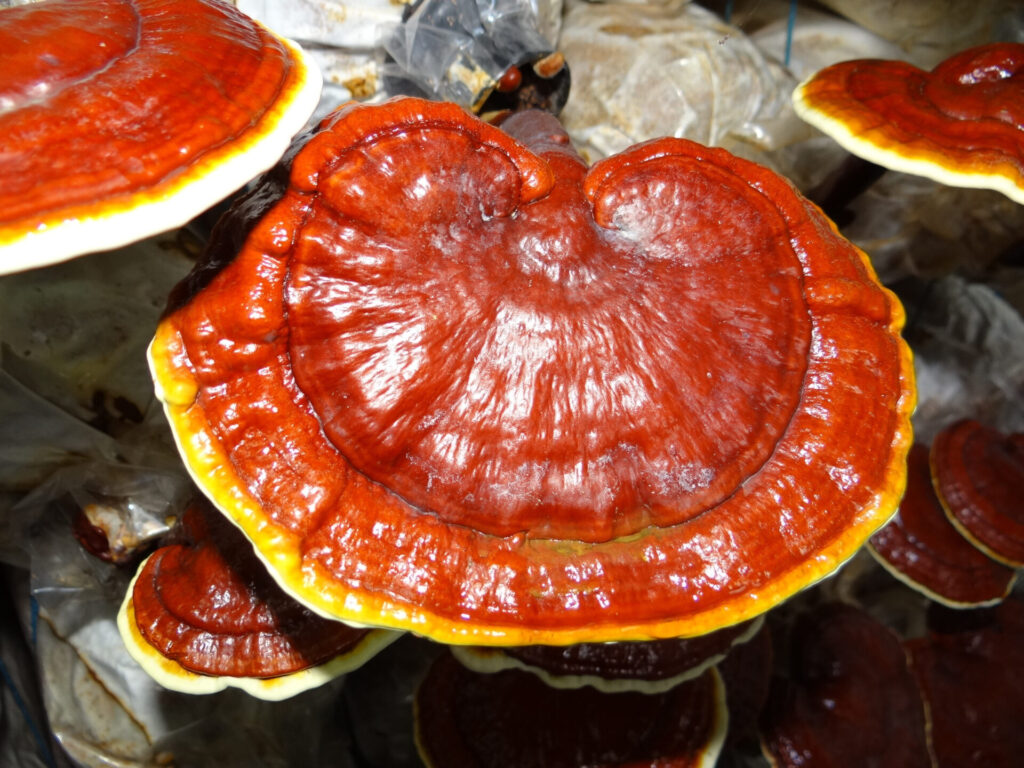
But these 100% natural superfoods are so much more than the latest health novelty to try out for a while. Particularly if you or your loved ones suffer from a condition that’s difficult to treat and cure, like fibromyalgia and autoimmune disorders – it’s high time you learn about the real and lasting power of functional mushrooms.
Now, to be clear, this discussion is not about “magic” psychedelic mushrooms! (That subject would take an article all on its own.)
We’re talking about those varieties of mushrooms (also known as fungi) that have particular curative properties. As such, they are not the common culinary mushrooms that we love to eat, although they also contain important nutrients and provide excellent health benefits (see below in this article).
Not all functional mushrooms are flavorful, nor are they readily available in food quantities needed for health results. Some are inedible in their whole mushroom form. So, packing your meals with these ‘shrooms will probably not do the trick.
The best way to gain health benefits from functional mushrooms is by taking them in capsule form, in extracts, and/or by adding mushroom powder to foods, like smoothies or soups.
These are powerful plant medicines, so we’ll explain how they work and which troubling health issues they treat.
NOTE: If you suffer from a complicated debilitating illness, it‘s a good idea to consult a naturopathic practitioner for suggested amounts of functional mushrooms for your particular situation – everyone is different!
Which Ailments Can Be Treated With Superfood Mushrooms?
Functional mushrooms work to treat several ailments that modern medicine struggles to treat and cure. All too many people are disappointed and frustrated when their medical practitioner either dismisses their not-easy-to-categorize symptoms or simply does not have any effective treatment protocols to offer.
You might notice that some of these categories overlap each other… for example, many inflammatory diseases are actually caused by autoimmune issues… and fibromyalgia is often thought to be an autoimmune disorder, but sometimes put into a category of its own… so we’ve separated them in the list below, for simplicity.
Functional mushrooms can help:
1. Fibromyalgia
2. Autoimmune Disorders – such as AIDS, Type 1 Diabetes, Celiac Disease, Lupus
3. Neurological Disorders – such as Alzheimer’s, Multiple Sclerosis, Depression
4. Inflammatory Disorders – such as Rheumatoid Arthritis, Inflammatory Bowel Disease, Heart Disease
5. Cancer – Breast cancer, stomach (gastric) cancer, among others
Functional Mushrooms and the Ailments They Treat
1. Reishi Mushrooms (Ganoderma lucidum)
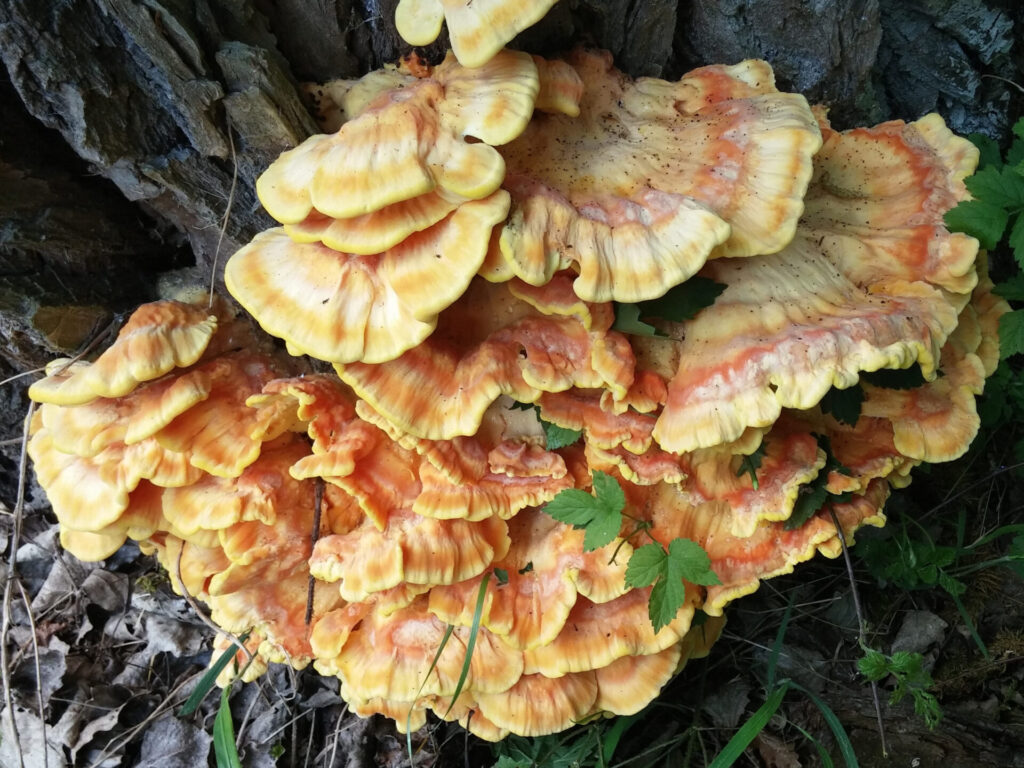
Reishi mushrooms are often referred to as the “Mushroom of Immortality” for good reason. These lovely brownish flower or fan-shaped mushrooms are well known in Eastern cultures as symbols of health, vitality, and longevity. Reishi mushrooms have several major benefits:
- Immune Boosting – Reishi mushrooms contain potent elements that combat oxidative stress and inflammation. They’re quite useful in treating autoimmune disorders, such as Type 1 (and possibly Type 2) diabetes, and fibromyalgia, as well as treating fatigue, sleeplessness, and depression.
- Anti-Cancer – Ganoderic acid present in reishi mushrooms is also known to inhibit cancer cell growth by suppressing tumor development and destroying existing cancer cells. Reishi strengthens the immune systems of cancer patients, particularly while taking treatments such as chemotherapy and/or radiation.
- Anti-Inflammatory – Reishi is anti-inflammatory, helping weight loss and reducing inflammation, thus also reducing high cholesterol levels. And, as mentioned above, inflammation is a primary cause of some serious illnesses, such as cancer, MS, rheumatoid arthritis, fibromyalgia, myocarditis, and more.
- Reduce Androgens Naturally – For those suffering from PCOS (Polycystic Ovary Syndrome) reishi mushrooms, especially red reishi, are the strongest adaptogens that reduce testosterone naturally.
2. Lion’s Mane Mushroom (Hericium erinaceus)
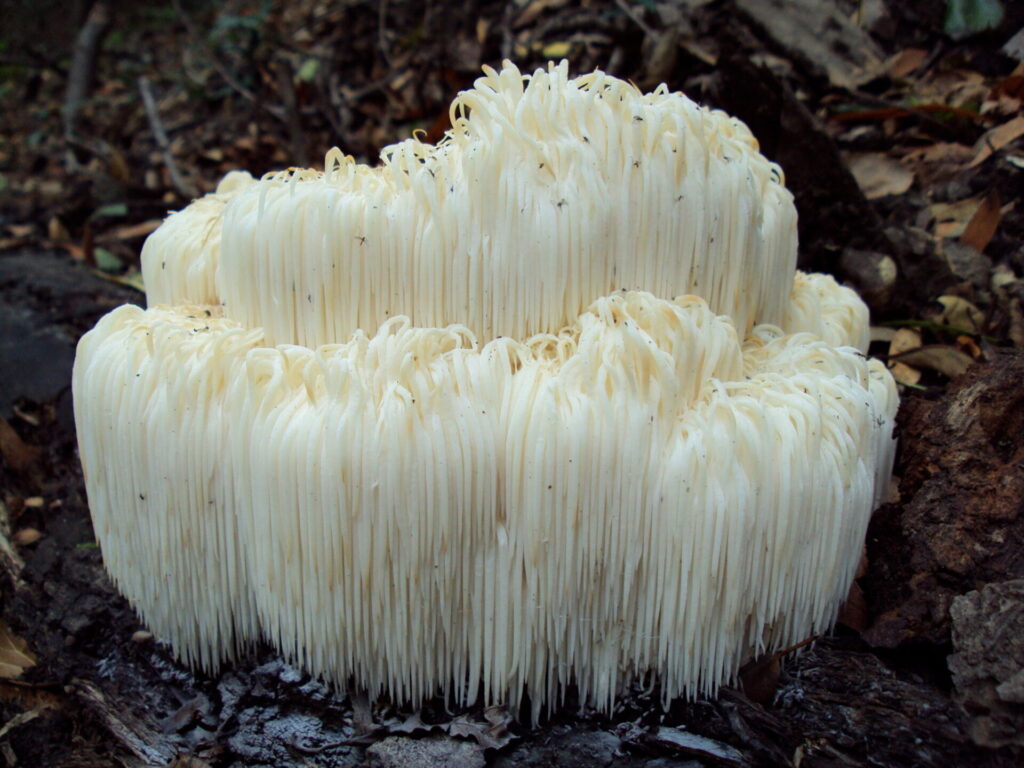
Lion’s Mane mushrooms are primarily found in Asia and have been used in TCM for thousands of years to treat several diseases. This beautiful white mushroom has long, wavy “spines” that flow downward, resembling a lion’s mane, hence its name. They can be eaten, (some say they have a texture and taste similar to lobster) but the best way to take them is as a powdered supplement.
- Neuro-Protective – Lion’s Mane contains compounds that aid cognitive functioning, so these mushrooms are often referred to as powerful “brain boosters” when taken regularly as a supplement. Compounds in Lion’s Mane aid in rebuilding neuronal pathways and help neuronal functioning, so dementia and Alzheimer’s sufferers experience improvement over time. Cognitive improvement is also seen in healthy people, so Lion’s Mane can be taken as a preventative to boost memory, creativity, and overall mental clarity.
- Anti-Inflammatory – Lion’s Mane mushrooms reduce colon tissue damage and improve gut microbe quality for those with inflammatory bowel syndrome. These mushrooms also help resolve other inflammatory conditions, such as heart inflammation.
- Anti-Cancer – Lion’s Mane inhibits tumor cell growth.
3. Chaga Mushrooms (Inonotus obliquus)

These woody and fibrous little fungi grow symbiotically on birch trees in the cold climes of the far north. As per their recorded history, Siberian and other northern cultures have long benefited from taking chaga for health. These fascinating mushrooms (which don’t resemble other mushrooms at all!) have a wide variety of health uses. They cannot be eaten on their own, so are taken as supplements.
- Anti-Aging – Chaga mushrooms contain powerful antioxidants that deter cellular degeneration, so are historically known to increase lifespan. These antioxidants also help keep skin youthful and treat skin ailments such as eczema and psoriasis from the inside, as well as topically.
- Brain Boosting – Chaga’s high polysaccharides levels contribute to its anti-aging effects, such as slowing down brain deterioration. Those impacted by Alzheimer’s and dementia find additional brain improvements from taking chaga, such as increased cognitive abilities and memory.
- Immune-Boosting – Chaga’s natural chemical compounds help the body to create cytokines, which are necessary to stimulate white blood cells that fight infection and viruses. Incredibly, chaga has dual functions: It assists cytokine stimulation, and at the same time, disallows the body from over-reactive defensive cytokine action (cytokine storm).
- Anti-Inflammatory – High antioxidant levels in chaga help to combat damage from free radicals. Free radicals left unchecked lead to inflammation that can cause havoc and create disease. If used regularly over time, chaga provides relief from inflammatory heart disease, rheumatoid arthritis, or fibromyalgia pain.
Note: Chaga gets its powerful curative compounds from the birch tree upon which it grows. Chaga that is lab-produced will not have the curative effects desired, so please make sure you source chaga from a reputable supplier.
4. Turkey Tail Mushroom (Trametes versicolor)
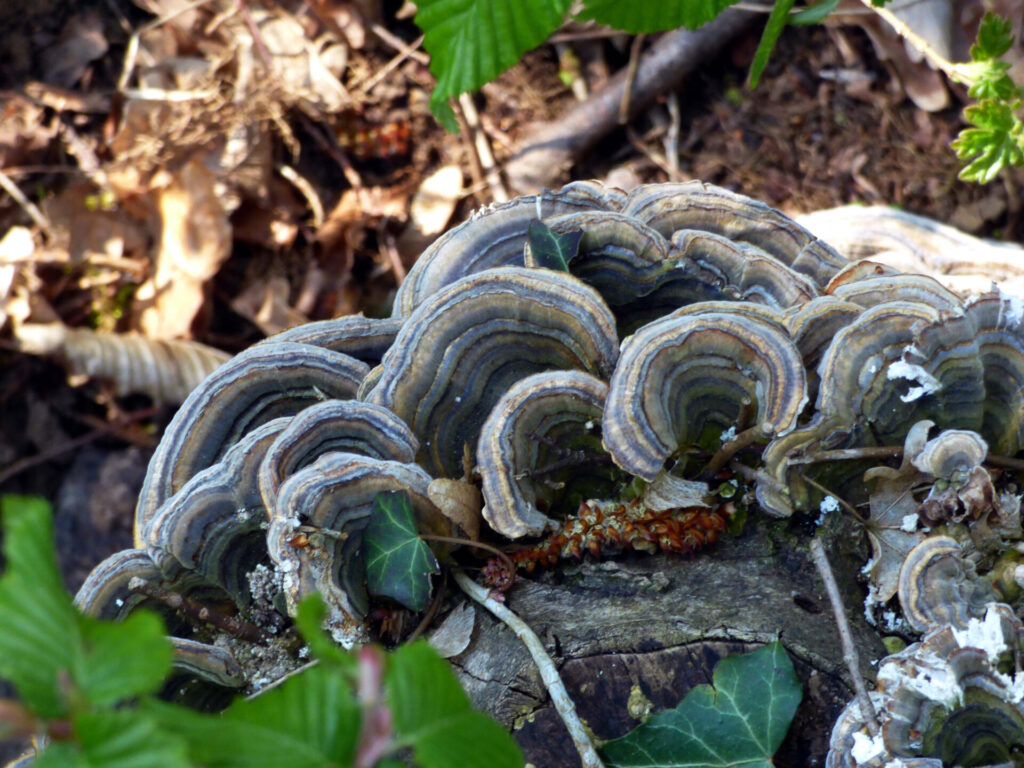
This beautiful mushroom resembles a “turkey tail” due to its variegated brown, gray, black, and white concentric bands. Turkey Tail has numerous uses, although it’s most widely known today for its anti-cancer properties.
- Anti-Cancer – Turkey Tail mushrooms contain the powerful chemical compounds polysaccharide peptide (PSP) and polysaccharide-K (PSK) known to identify and destroy cancer cells.
- Immune-Boosting – Another astounding benefit of turkey tail mushrooms is the immune strengthening that they provide. Particularly in the case of those taking modern cancer treatments such as chemotherapy and radiation, turkey tail mushroom compounds counteract the often debilitating effect those treatments have on the immune system. Japan and China both use a drug based on turkey tail components when treating cancer patients who are taking cancer treatments.
- Antiviral, Antimicrobial – Turkey tail is known to help cytokine creation, which stimulates our bodies to create more infection-fighting cells. This is important to combat colds, flu, fungal infections, and viral infections including the Human Papilloma Virus(HPV), HIV, and AIDS.
- Anti-Inflammatory – Turkey tail mushrooms contain a high percentage of anti-inflammatory compounds. It’s a powerful supplement for anyone seeking relief from any chronic condition that has its basis in inflammation such as fibromyalgia, cancer, heart disease, and various skin conditions.
Culinary Mushrooms With Medicinal Benefits
In addition to the incredible functional mushrooms listed above, we shouldn’t leave out culinary mushrooms that also have excellent health benefits. Food is medicine, so it’s important to add foods to our diets that are not only delicious but are good for our health. These mushrooms can also be taken as supplements.
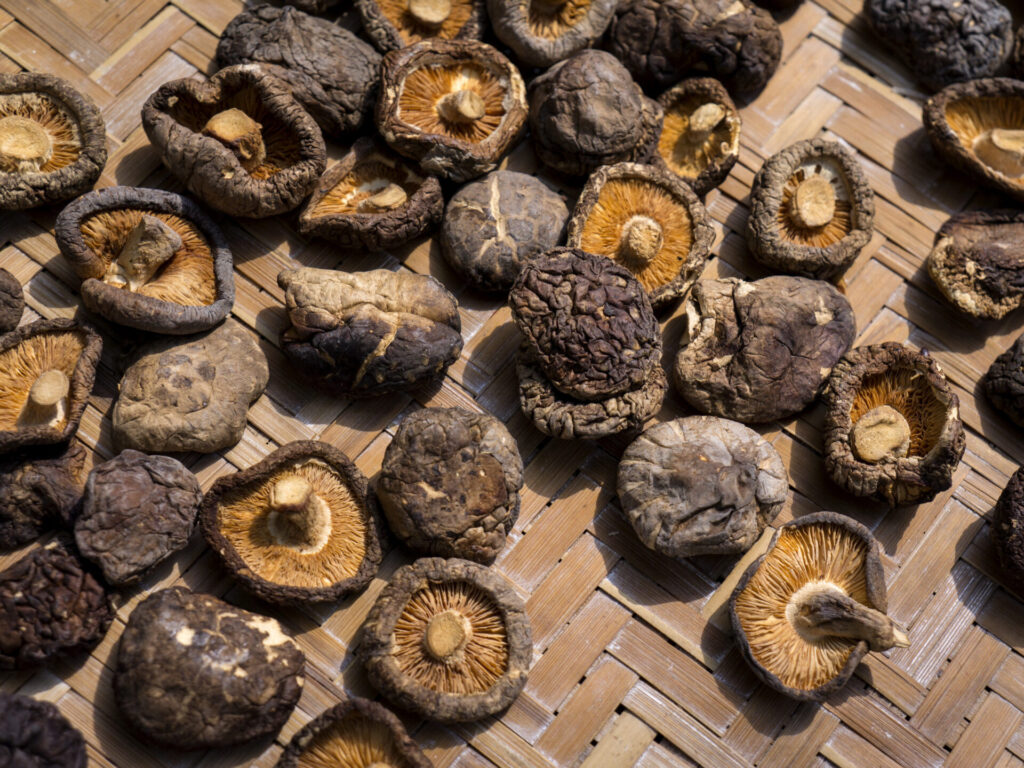
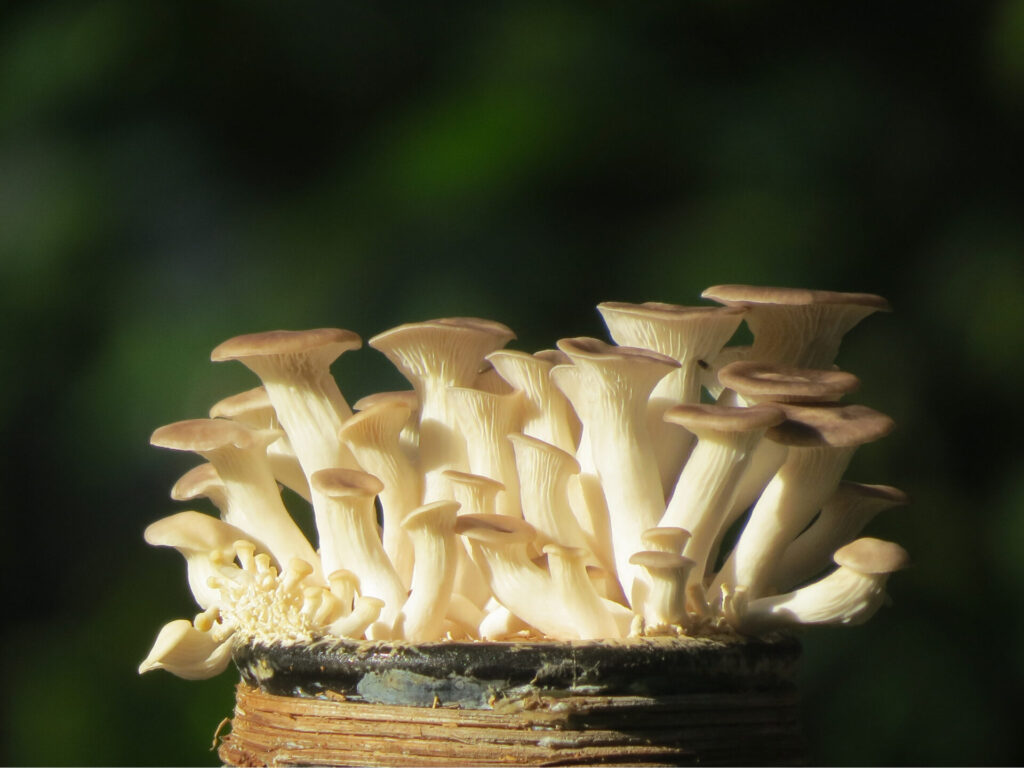

1. Oyster Mushrooms (Pleurotus)
These tasty white mushrooms are anti-inflammatory, analgesic (pain relieving), and anti-cancer due to their high polysaccharide count.
2. Shiitake Mushrooms (Lentinula edodes)
These yummy mushrooms are high in anti-inflammatory compounds and also have antitumor properties. They support immune strength and protect against colds and flu.
3. Maitake Mushrooms (Grifola frondosa)
Maitake mushrooms are high in beta-glucans, providing immuno-modulation – this means that they’re useful to either suppress or enhance the immune system’s responses according to need. They’ve also been shown to have anticancer properties and to resolve hormonal imbalances, such as Polycystic Ovary Syndrome (PCOS) in women.
4. Portabello Mushrooms (Agaricus bisporus)
High in antioxidants and full of plant-based protein, these large, hearty, and tasty brown mushrooms (also sold as Portabella mushrooms) have anticancer properties. They inhibit tumor growth and replication.
Specifically, this is due to their high concentration of conjugated linoleic acid (CLA). They are also anti-inflammatory and contain phytonutrients that combat joint pain and fatigue while balancing hormone levels.
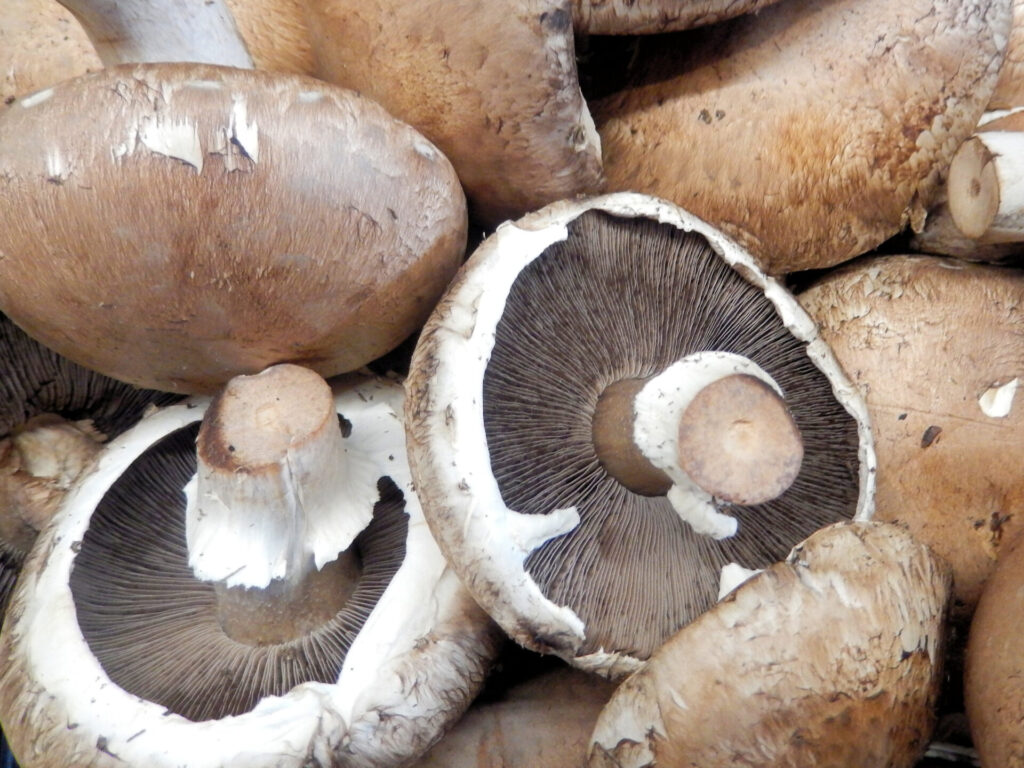
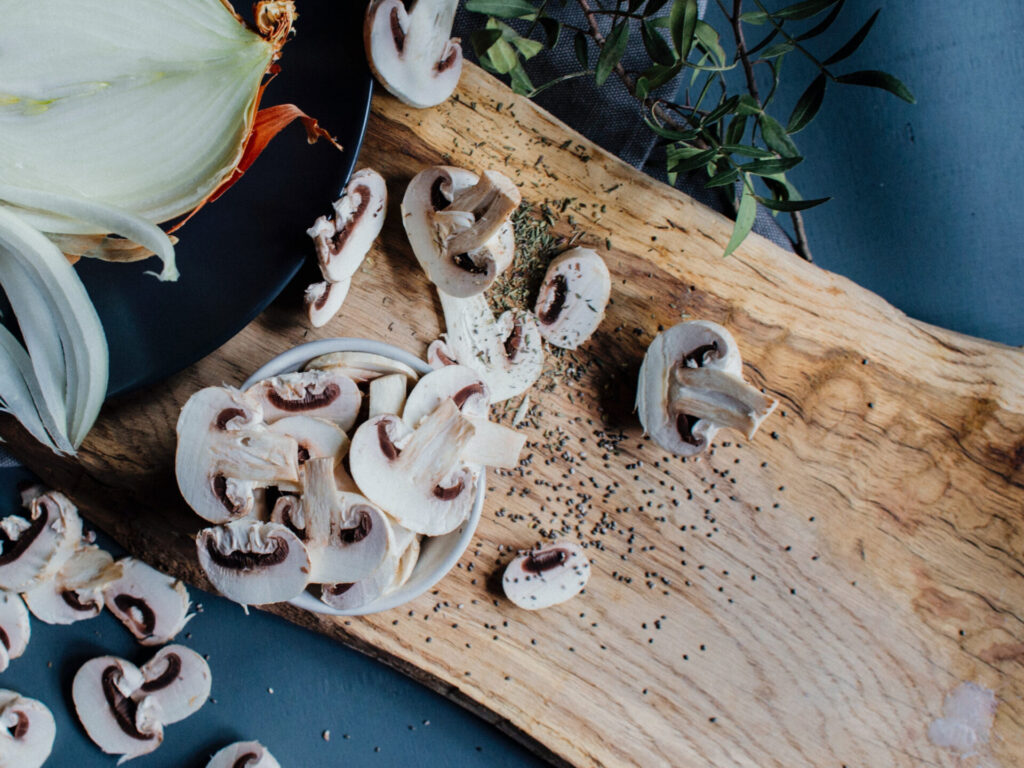
5. White Button Mushrooms – (Agaricus bisporus, immature)
And before you think to write off our old standby, the common white button mushroom, we’ll remind you that these delicious favorites are actually the baby version of the large brown Portabellos that get so much more culinary clout these days!
And the more grown up, yet still immature light brown Cremini mushrooms are really just the teenagers of the same mushroom family.
White button mushrooms are high in minerals, vitamins, and nutrients that regulate cholesterol (thus helping to avoid stroke and high blood pressure), help control blood sugar, strengthen the immune system, and relieve stress among other helpful health benefits.
What To Look For When Shopping For Functional Mushrooms
Buying functional mushrooms can be a bit daunting, as there are many choices out there and not all products are equal. Functional mushroom products are effective only when they’re made from the fruiting body of the mushroom, that is, the part that grows above ground.
If the product also contains the spores, that’s even better (although not often available). The underground part, or root, known as the mycelium, does not contain the powerful medicinal value that you need in a medicinal mushroom.
This is so important that the FDA ruled that mushroom products made from the mycelium must contain that information on their labels… but the labels don’t have to explain that the medicinal value of the fruiting body (mushroom part) of the fungus is what’s most effective for treating disease – not the mycelium! So you need to understand what that means.
Also, functional mushrooms that grow in their natural conditions on trees and plants or are symbiotically parasitic, receive many of their medicinal healing nutrients from the host plant. Because wildcrafting of functional mushrooms is not a mass-production business, some companies decided to reproduce mushroom mycelium in labs or on farms, by growing them on grain hosts (rather than the original tree or plant hosts that the mushroom grows on in the wild).
They do not allow the mycelium to grow long enough to produce fruiting bodies and, therefore, powdered mycelium products are not capable of offering the nearly magical biochemical components that mushroom fruiting bodies and/or mushroom spores contain.
Please read carefully before purchasing a functional mushroom product to know what you are getting. You’ll want to look for products that specifically state that they contain the fruiting body of the mushroom.
For more info, you could also read this article that explains counterfeit medicinal mushrooms written by Nicole Apelian, an herbalist who manages her MS with the help of functional mushrooms (in addition to dietary restrictions and other natural healing modalities over time).
Conclusion
Functional mushrooms have been prized over millennia for their curative properties. More recently, modern societies (and science) have come to understand their medicinal value. It’s important to know that these powerful natural fungi are available for our health benefit.
The main point to take away from this article is that there is hope for those who suffer from debilitating and often confusing chronic conditions. There is so much more information available that can be gleaned about how functional, or medicinal mushrooms can help your specific issues – far more information than is reasonable to include in this article. But it’s available if you take the time to do some deep Internet searching.
Many, many anecdotal articles relate the personal health journeys of those who came before you, who have discovered natural ways to regain their health — in particular, through the use of functional mushrooms, along with other natural protocols.
There is no “one-size-fits-all” formula for healing your body, but every little bit of information can be a piece to complete your personal health puzzle. Medicinal mushroom superfoods can truly help those looking for pain relief!
Sources:
- Lion’s Mane Mushroom image courtesy of Wikimedia.org, LIcense 3.0
Disclaimer: This post is for informational purposes only. Any material herein is the expressed opinion of the authors and is not a substitute for professional advice, diagnosis or treatment, nor has it been evaluated by any regulatory agency. All use of information herein is solely at the risk and discretion of the reader. Have a blog? This post is for sale. Contact us.